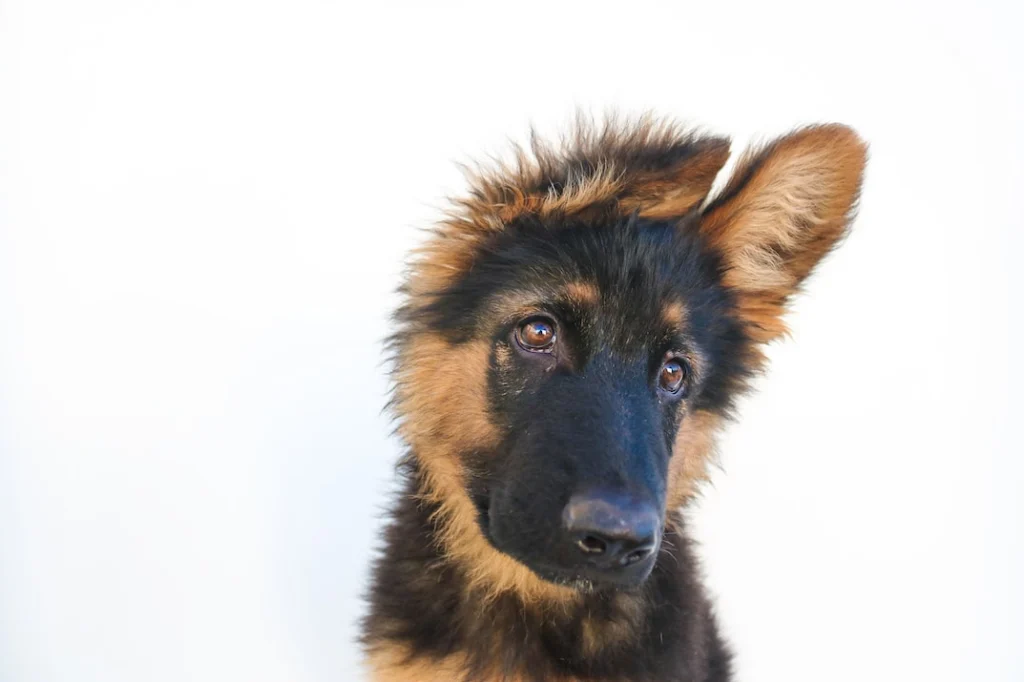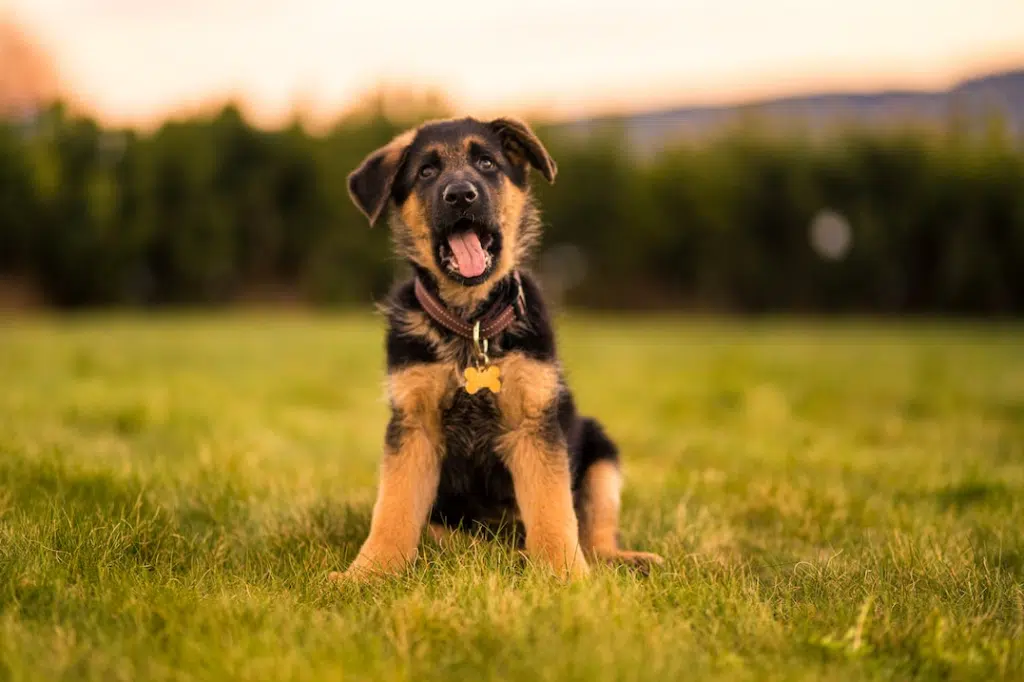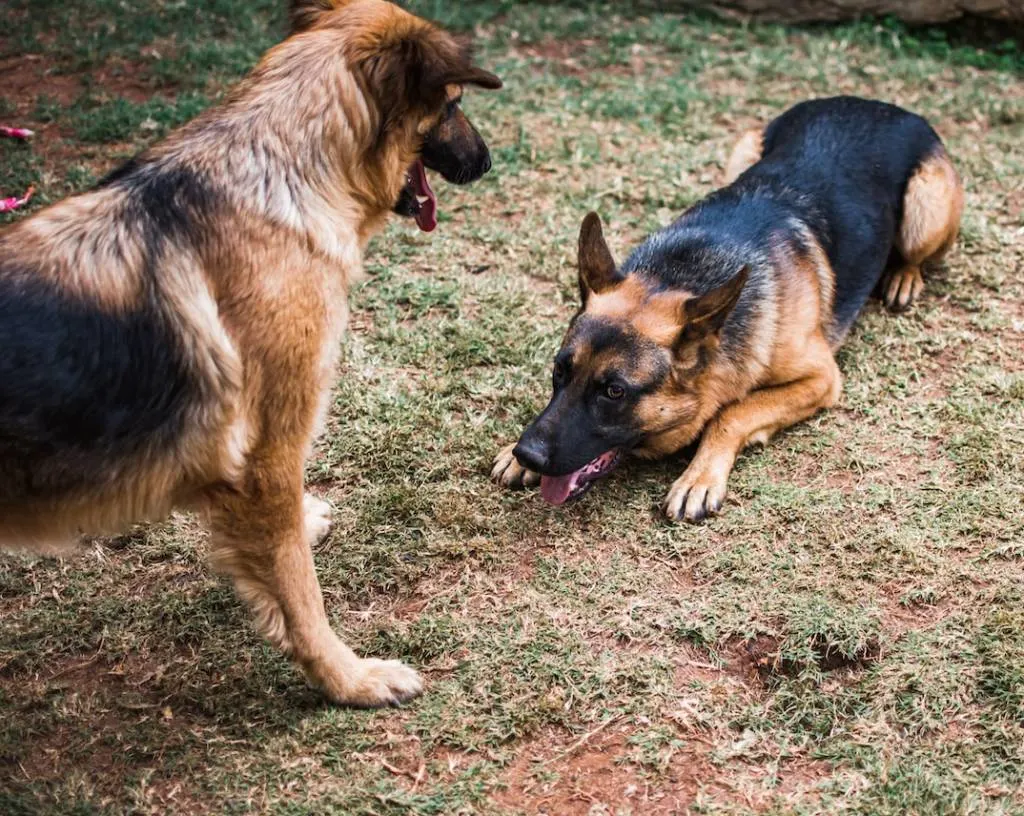Socializing Your German Shepherd Puppy
|
Prefer listening over reading? We got you covered!
Getting your Trinity Audio player ready...
|
Bringing a German Shepherd puppy into your home is an exciting time. These intelligent and loyal dogs make great companions, but it’s important to start socializing them from a young age. Proper socialization is crucial for the development of a well-rounded and confident dog.
In this article, we will discuss why socialization is important and when to start socializing your dog. We’ll also go over how to properly socialize an older German Shepherd – including socialization techniques, and some common challenges should expect.
Key Takeaways
- Early and gradual exposure to new dogs, people, and experiences helps build their confidence and reduces fear or aggression. Socializing your GSD pup as early as 8 weeks lays the foundation for a friendly and well-adjusted companion throughout their life.
- The critical period of puppy socialization occurs between 8 weeks to 12 or 16 weeks of age. During this time, your dog is more receptive to new experiences.
- Creating a puppy socialization checklist is essential for a gradual and successful socialization process. It should incorporate important training aspects like crate training, housetraining, and obedience training.
- Patience and understanding are vital in puppy socialization to foster a trusting and positive learning experience for your GSD puppy.
Importance Of Socializing Your GSD Puppy

Understanding the Socialization Process
Socialization is the process of introducing your GSD puppy to new objects, people, places, and experiences in a positive and controlled manner. The critical period for socialization starts at around 8 weeks and lasts until about 16 weeks. During this time, puppies are most receptive to learning and forming positive associations. By gradually introducing your pup to new situations, new people, and animals you can help them develop confidence and overcome fears.
The Benefits of Socializing Your German Shepherd Puppy
In any dog socialization cannot be overemphasized. Proper and early socialization has numerous benefits for your canine. It helps them to become more adaptable and less reactive. This reduces the likelihood of behavior issues such as fearfulness or aggression. Socializing your young puppy also enhances their ability to handle stress and new environments as they grow into adult dogs. Additionally, socialized dogs are generally more comfortable around other dogs and can interact with new people with ease.
The Consequences of Not Socializing Your Puppy
If you fail to socialize and train a German Shepherd puppy, it may develop behavioral problems later in life. These can include:
- fear,
- anxiety,
- aggression toward other dogs or strangers.
Unsocialized German Shepherds may become reactive in new situations, making it difficult to handle them in public settings. To avoid these negative consequences, it’s essential to prioritize socialization from an early age.
When Should You Socialize A German Shepherd Puppy?
The Critical Period: Socializing at 8 Weeks
The critical socialization period for socializing GS puppies begins at around 8 weeks of age. It is during this time that puppies are most receptive to new experiences. This is also the time when they are more likely to form positive associations. As such, the key to getting your German Shepherd pup well-behaved is early socialization. Introduce your puppy to a variety of people. Get them familiar with family members, friends, and strangers, to help them become comfortable and confident in different social situations.
Gradual Introduction to New People and Situations
Begin by slowly introducing your dog to unfamiliar people and situations. Let them approach new individuals at their own speed. Use treats and praise to encourage calm and friendly behavior. Take your puppy to different places like parks, markets, and busy streets. This helps them get used to various sights, sounds and smells.
Puppy Socialization Checklist

Bring Your Puppy Home
Bringing your new German Shepherd home is the initial and crucial step in the socialization process. When they arrive, set up a peaceful and upbeat atmosphere for them to adapt comfortably. Begin by arranging a cozy spot with bedding and toys. Reduce loud sounds and offer a calm place for them to rest when needed. Use positive reinforcement and gentle training for building trust. In the first phase of socialization, your focus is on bonding with your pup.
Socialize Your Dog
Just like puppies of other breeds, German Shepherd puppy socialization has a critical window that starts at 8 weeks old and closes at 12 to 16 weeks. It’s important to introduce them to various people and situations during this time, especially because German Shepherds are naturally protective dogs.
This early exposure helps your puppy learn which strangers are friendly and not threatening. Getting your pup comfortable around new dogs and people fosters confidence and prevents fear or aggression. Let your puppy observe and pick up on your cues. Avoid forcing your canine to quickly get used to the presence of new people. It is important to understand that your puppy needs time to adjust and socialize. As a responsible pet owner, make sure to socialize your puppy safely by creating positive experiences in non-threatening situations.
Begin Crate Training
Crate training involves introducing your GSD pup to a crate. This serves as their personal and safe den where they can relax and feel secure. The process should be gradual and done steadily. Make sure your German Shepherd pup is able to create positive associations with the crate through treats, toys, and praise.
- Begin by leaving the crate door open and allowing your puppy to explore it at their own pace. Place soft bedding and a few toys inside to make it inviting. Encourage your puppy to enter the crate voluntarily, and reward them with treats or praise when they do so. This positive reinforcement will help them associate the crate with positive experiences.
- Start with short periods of time in the crate, such as during meals or naps. Gradually extend the time as your puppy becomes more comfortable. Never use the crate as a form of punishment, as this will create negative associations and hinder the training process.
- Crate training is not only about providing a safe space for your puppy; it also aids in housetraining. Dogs naturally avoid soiling their den, so when used appropriately, the crate can help reinforce your puppy’s natural instinct to hold their bladder and bowels.
Consistency is key during crate training. Stick to a regular schedule for meals, playtime, potty breaks, and crate time. This routine will help your puppy learn what to expect and create a sense of stability.
Start Housetraining
Housetraining a young dog is an important process to help them develop appropriate bathroom habits both indoors and outdoors. It requires consistency, patience, and positive reinforcement to effectively teach them where it’s acceptable to go potty.
One of the first steps in housetraining is to establish a regular potty schedule. Take your puppy outside at specific times throughout the day, such as after meals, waking up from a nap, or after playtime. This helps them understand when and where they should go potty, making it easier for them to learn.
When your puppy successfully goes potty in the right place, praise and reward them with treats or verbal praise. Positive reinforcement creates a positive association with going outside. This makes them more likely to repeat the behavior in the future.
Supervision is crucial during housetraining. When indoors, keep a close eye on your puppy, and if you notice any signs that they need to go potty, quickly take them outside to the designated spot. This prevents accidents indoors and reinforces the idea that outside is the appropriate place to relieve themselves.
Be patient and understanding during the housetraining process. Accidents are normal, especially in the beginning. Avoid scolding or punishing your puppy for accidents as this may create fear or confusion. Instead, focus on reinforcing positive behavior and calmly cleaning up any accidents with an enzymatic cleaner to remove the scent. This helps avoid attracting them back to the same spot.
Commence Obedience Training
Start puppy obedience training early, as pups are like sponges and can learn quickly. Use positive reinforcement techniques. Use treats, praise, and play as rewards to get your puppy to follow commands and make your German Shepherd pup repeat desired behaviors.
Focus on teaching basic commands like sit, stay, come, and down. Be patient and consistent during training sessions. Keep them short and engaging to prevent your puppy from getting bored or overwhelmed. Gradually increase the difficulty of commands as your puppy progresses, and always end each session positively.
Remember, German Shepherds are intelligent and eager to please, making them highly trainable. Raise your German Shepherd to be a friendly and well-behaved dog with obedience training.
Recall
“Recall” refers to teaching your puppy to come to you when called, regardless of distractions or distance. Start recall training in a safe and controlled environment.
Begin with short distances and gradually increase the distance as your puppy becomes more reliable in coming when called. Use a happy and enthusiastic tone of voice to make the recall command enticing and enjoyable for them.
Practice recall training regularly in various settings. Introduce your dog to new distractions gradually to ensure your puppy responds even in challenging situations.
A well-trained recall will give you peace of mind when off-leash and allow your puppy to enjoy more freedom while remaining under your control.
Develop Impulse Control
Impulse control training for any dog is crucial for teaching them self-discipline and preventing impulsive behaviors. Begin with simple exercises like “wait” or “stay” commands. Gradually increase the duration and difficulty as they improve. Use positive reinforcement to reward them for staying calm and patient, even in exciting or distracting situations.
Practice impulse control exercises regularly during various activities, such as during mealtime, before going outside, or when greeting people.
How to Properly Socialize an Older German Shepherd Dog
Overcoming Fear and Trust Issues
Socializing an adult German Shepherd that may have fear or trust issues requires patience and understanding. Take things slowly and create positive experiences for your dog. Gradually expose them to new people, places, and situations while providing rewards and reassurance. Seek the help of a professional dog trainer or behaviorist if your older dog shows signs of fear or aggression.
The Importance of Positive Experiences
Positive experiences are crucial when socializing with an older German Shepherd. Focus on creating situations that your dog enjoys and associates with pleasant outcomes. Use treats, toys, and praise to reward calm and confident behavior. Avoid forcing your dog into uncomfortable situations and always monitor their body language for signs of stress or anxiety.
Tips for Socializing an Older German Shepherd
When socializing an older German Shepherd, take it one step at a time. Start with low-stress environments and gradually increase the difficulty level. Enroll your dog in a training class or obedience course where it can learn commands and interact with other dogs in a controlled setting. It’s important to be patient and understanding, as older dogs may take longer to adjust and overcome their fears.
Socializing Your German Shepherd: Tips and Techniques
Take Your Puppy to New Places
Taking your dog to new places is an excellent way to socialize them. Choose new sights that are dog-friendly such as pet stores, cafes with outdoor seating, or parks where dogs are allowed. Ensure that your puppy is up to date on vaccinations and keep them on a leash during outings.
Expose Your Puppy to Different Environments
Expose your canine to different environments to help them adapt to various situations. Introduce them to different surfaces, sounds, and sights, such as walking on different types of flooring, encountering traffic noises, or meeting people wearing hats or uniforms. Gradually increase the complexity of the environments to build their confidence.
Enroll in a Puppy Training Class
Enrolling your dog in a puppy training class or a puppy kindergarten is highly recommended for socialization and basic obedience training. These classes provide structured socialization opportunities with other puppies and teach essential commands and behaviors. Look for reputable trainers or training facilities that use positive reinforcement techniques for the best results.
Introducing Your German Shepherd to Other Dogs
Properly socializing German Shepherd puppies includes introducing them to other dogs. Arrange playdates with friendly, well-socialized dogs to help your puppy learn appropriate social skills and build positive relationships. Visit a dog park once your puppy has completed their vaccinations to allow them to interact with a variety of dogs in a controlled and supervised environment.
Common Challenges in German Shepherd Socialization

Dealing with Fearful Behavior
Fearful behavior can be a common challenge during the socialization process. If your canine displays signs of fear, take a step back and revisit previous steps in a less intimidating environment. Gradual exposure, positive reinforcement, and desensitization techniques can help your puppy overcome their fears.
Managing Aggression and Dominance
German Shepherds may exhibit aggressive or dominant behavior if not properly socialized. It is essential to establish yourself as the pack leader and provide consistent guidance and boundaries. Seek professional help if your dog displays aggressive tendencies to ensure the safety of both your dog and others.
Addressing Separation Anxiety
Separation anxiety can manifest as destructive behavior or excessive barking when your German Shepherd is left alone. Proper socialization can help prevent or alleviate separation anxiety. Gradually increase the duration of time your puppy spends alone, provide stimulating toys, and ensure they have a comfortable and secure space to relax in your absence.
Final Thoughts
Socializing your German Shepherd puppy is an essential aspect of its development and well-being. During their critical socialization period between 8 weeks to 12 or 16 weeks, gradually introduce them to new dogs and people. Build their confidence using positive reinforcement. You may use treats, praises, and plays to help your dog form positive associations with the desired behaviors.
When socializing your dogs, it is important to be patient and understanding. Let your dog learn and adapt at their own pace. Never punish or scold your dog during accidents and setbacks as this will confuse your pup. Remember, the key to properly socializing your canine is by creating positive experiences in non-threatening situations.
Other important elements of socialization include crate training, housetraining, obedience training, recall, and impulse control. All these will ensure your GSD puppy becomes a well-mannered, obedient, and well-adjusted companion.
With patience, consistency, and positive reinforcement, your dog will grow into a happy, confident, and loving member of your family.




















